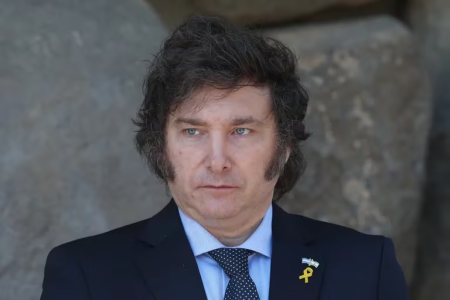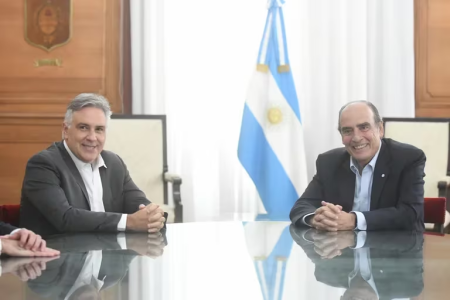AntoniCOM
New member
Milei's fight with governors and mayors escalates over the cost of the adjustment and the dialogueists look for a way out - Infobae

Source:

 www.infobae.com
www.infobae.com
February 16, 2024
With harsh criticism, the president defended the decision not to send more funds for teacher salaries and transportation. More provincial and municipal leaders are threatening to go to court. The Llaryora case, a key meeting and the Macri factor
By Facundo Chaves

The last meeting of the governors with officials of the Casa Rosada. From there, everything got worse.
Javier Milei is determined that the cost of the adjustment does not fall only on the Presidency and the national accounts. The escalation that has worsened in the last few hours with the governors and mayors is part of that logic: the president is determined that each jurisdiction is obliged to drastically reduce their budgets, the number of public employees and the destination of taxes they collect and the transfers they receive from the central administration.
The clash between Milei and pop singer Lali Espósito cannot be understood if it is not incorporated into this same sequence of the president ruthlessly applying a “Chainsaw Plan” that aims to adjust more than 5% of the Product. Almost all of the politicians who emerged from the popular vote - who are not from La Libertad Avanza or the PRO - are up in arms for these resources: from governors to mayors, from deputies to senators.
Each one in their own way undertook resistance to the draconian fiscal plan proposed by Milei as the first step to break a status quo of economic stagnation, growth in poverty and accelerated deterioration in the quality of life of Argentines. What unifies all of Milei's antagonists is the reduction in the sending of funds from the Nation. It is an argument for money, but one in which politics, values and also ideology are mixed.

Javier Milei is willing to take his "chainsaw plan" at any cost and to the ultimate consequences
These measures, which at first the provincial leaders believed were provisional, remained firm and forced each one to face and explain the consequences of the elimination of those benefits. But to put numbers: due to the pruning of the Fund
Governors who maintain an open confrontation and others who try to keep a dialogue alive with the Casa Rosada admit that the total mass of money that was taken from them is in the order of a complete wage bill. If we add to that what they lost due to the elimination last year of the Income Tax, which collected money that was later sent to the provinces, the leaders have to govern with two fewer monthly salaries. At least and in an inflationary and recessionary year.
The provincial executives, after the failure of the talks with the Minister of the Interior, Guillermo Francos, and the commitments he assumed and were not fulfilled, and the worsening of the pruning of national resources, multiplied contacts and direct conversations by telephone and directly in meetings in Buenos Aires, as well as the exchanges in the WhatsApp group that the 24 leaders from all over the country have.
In these contacts three paths were defined. A group chose to take their claims for restitution of funds to Justice, most of them Peronists; another group that voted against the “Omnibus Law” but is not in a position to move for or against the government, and a last group that is determined to prevent the dialogue from being irreversibly broken.
Regarding the first, the Peronist Ricardo Quintela (La Rioja), the Kirchnerist Gerardo Zamora (Santiago del Estero), the PRO Ignacio Torres (Chubut) and the provincials Alberto Weretilneck (Río Negro) and Rolo Figuero (Neuquén) stand out. Each one went to court for different reasons, but they all know that they will have to wait for a definition from the Supreme Court, which has no deadlines or urgency.

Llaryora and the Minister of the Interior, Guillermo Francos, who was weakened in front of the governors
The fight between Milei and Martín Llaryora - like that of Lali Espósito - has a different dimension in this entire landscape. The fact is that the Cordoba president was one of the moving targets that the president targeted and who received a harsh response from him. Throughout the week there were exchanged darts, accusations of betrayal and responses in harsh terms.
The president's successor to Juan Schiaretti is accused of having led the rebellion in the Chamber of Deputies against the articles and subsections of the “Omnibus Law” that affected production and employment, by rejecting withholdings, and having opposed the elimination discretionary trust funds. Llaryora, in addition, was the one who most demanded the distribution with the provinces of the COUNTRY Tax, which Milei openly and emphatically refused to grant.
" I don't have to apologize for anything, if he claims the phrase to himself, it's his problem (...) I'm not in politics to solve psychological problems, let the psychologist solve them ," the president responded yesterday when They asked him about the harsh rejection that the Cordoba governor had expressed to their accusations of treason.
The truth is that both the president and libertarian leaders treated the Córdoba deputies as having betrayed an agreement to approve the law in the lower house. “We did not have and do not have any political agreement with Milei. We don't owe him anything nor do we have to be loyal. Our deputies supported the opinion in committee, they voted in general for the project and in particular for most of the articles. We have four deputies and in one of the votes they lost 150 to 99. What they say is disproportionate,” responded a source from the Córdoba ruling party.
Beyond that escalation that Milei and Llaryora had, the governor, at the end of Thursday, sent a signal of detente to the Casa Rosada. In dialogue with Infobae, before returning to his province, the governor expressed confidence that the president and the government in general will "lower the decibels", leave the mistreatment and insults behind, and showed himself willing to resume dialogue.
Meeting of allies

The governors of the UCR and the PRO will meet to carry out catharsis and define a course
Along the same lines, the majority of the 10 governors of the UCR and the PRO planned to hold a meeting by videoconference to analyze the way forward in the face of this trap in which Milei put them. “We are going to do catharsis and we are going to define what to do. “We want to help but they don't help so that we can help them,” said one of those summoned to the meeting on Thursday night.
In that group are Maximiliano Pullaro (Santa Fe), Jorge Macri (City of Buenos Aires), Alfredo Cornejo (Mendoza), Gustavo Valdés (Corrientes), Rogelio Frigerio (Entre Ríos), Marcelo Orrego (San Juan), Claudio Poggi (San Luis), Leandro Zdero (Chaco), Carlos Sadir (Jujuy) and Nacho Torres from Chubut . “Even if we disagree, we have to be able to talk, sit at the same table and find points of consensus. And if it is not possible, continue, without insulting each other. Seeing what the president is doing with Lali Espósito, with Llaryora and with some of us who gave him the body makes things very difficult for us,” continued another source from that group.
And he added: “Anything can happen in the meeting. "Let it be decided to all go to court together, come out with a statement or even ask Mauricio Macri to be a factor of unity and moderation to prevent this conflict from continuing to escalate." Is the leader of the PRO in a position to be a factor of detente?

La Red Federal de Intendentes se reunió para rechazar las medidas del gobierno de Milei
En esta línea de resistencia al plan de ajuste, intendentes del interior se reunieron en la Casa de Córdoba para exigirle al Gobierno que revierta la decisión de no enviar los recursos para subsidiar la tarifa de los colectivos y reclamaron una audiencia con Guillermo Francos, al tiempo que no descartaron, también, impulsar por la vía judicial medidas para frenar la disposición de Javier Milei.
Los dirigentes integran la Red Federal de Intendentes que se forjó a principios de febrero con el objetivo de aunar fuerzas para este reclamo contra el Gobierno nacional. El grupo tiene como referentes a intendentes como Pablo Javkin (Rosario), Daniel Passerini (Córdoba), Guillermo Montenegro (Mar del Plata), Juan Manuel Llamosas (Río Cuarto), Rosario Romero (Paraná) Jorge Jofré (Formosa), Mariano Gaido (Neuquén), Juan Pablo Poletti (Santa Fe). En total son 40. Hay peronistas, radicales, del PRO, socialistas y vecinalistas.
El 9 de febrero, el Gobierno anunció la decisión de discontinuar el envío de recursos para las provincias a través del Fondo Compensador del Interior, que era destinado para subsidiar a las empresas de colectivos y, por ende, incidía en el precio de las tarifas del transporte público. Ese fondo contemplaba unos $102.000 millones. En un comunicado, se informó que “las ciudades del interior del país acordamos una serie de medidas y acciones, ante la preocupante e inconsulta decisión del Gobierno Nacional de eliminar el Fondo Compensador del Transporte”. Allí fueron expuestas las vías judiciales y también gestiones ante el Congreso.
Los intendentes todavía no sabían que los diputados y senadores ya se habían ido la mayoría a sus provincias. Es que hasta el 1° de marzo no habrá actividades porque después del traspié que tuvo La Libertad Avanza con la “Ley Ómnibus” decidió no extender las sesiones extraordinarias. El otro poder surgido del voto popular, el parlamentario, ya había hecho su trabajo. Fue el primero que enfrentó el “plan motosierra”.

Source:

Escala la pelea de Milei con gobernadores e intendentes por el costo del ajuste y los dialoguistas buscan una salida
Con duras críticas, el presidente defendió la decisión de no enviar más fondos para salarios docentes y transporte. Más mandatarios provinciales y municipales amagan con ir a la Justicia. El caso Llaryora, un encuentro clave y el factor Macri
February 16, 2024
With harsh criticism, the president defended the decision not to send more funds for teacher salaries and transportation. More provincial and municipal leaders are threatening to go to court. The Llaryora case, a key meeting and the Macri factor
By Facundo Chaves

The last meeting of the governors with officials of the Casa Rosada. From there, everything got worse.
Javier Milei is determined that the cost of the adjustment does not fall only on the Presidency and the national accounts. The escalation that has worsened in the last few hours with the governors and mayors is part of that logic: the president is determined that each jurisdiction is obliged to drastically reduce their budgets, the number of public employees and the destination of taxes they collect and the transfers they receive from the central administration.
The clash between Milei and pop singer Lali Espósito cannot be understood if it is not incorporated into this same sequence of the president ruthlessly applying a “Chainsaw Plan” that aims to adjust more than 5% of the Product. Almost all of the politicians who emerged from the popular vote - who are not from La Libertad Avanza or the PRO - are up in arms for these resources: from governors to mayors, from deputies to senators.
Each one in their own way undertook resistance to the draconian fiscal plan proposed by Milei as the first step to break a status quo of economic stagnation, growth in poverty and accelerated deterioration in the quality of life of Argentines. What unifies all of Milei's antagonists is the reduction in the sending of funds from the Nation. It is an argument for money, but one in which politics, values and also ideology are mixed.

Javier Milei is willing to take his "chainsaw plan" at any cost and to the ultimate consequences
The fight with the governors
The governors are part of the first line of resistance to the adjustment plan. They won when they stopped the “Omnibus Law”, which significantly cut discretionary items, resources and funds. Milei does not forgive her for that defeat and she acted quickly accordingly: she eliminated transportation subsidies, removed the teacher incentive fund and removed from their positions two officials who responded to Córdoba and Salta, two wayward provinces. In addition, the sending of funds for infrastructure in popular neighborhoods was paralyzed.These measures, which at first the provincial leaders believed were provisional, remained firm and forced each one to face and explain the consequences of the elimination of those benefits. But to put numbers: due to the pruning of the Fund
Governors who maintain an open confrontation and others who try to keep a dialogue alive with the Casa Rosada admit that the total mass of money that was taken from them is in the order of a complete wage bill. If we add to that what they lost due to the elimination last year of the Income Tax, which collected money that was later sent to the provinces, the leaders have to govern with two fewer monthly salaries. At least and in an inflationary and recessionary year.
The provincial executives, after the failure of the talks with the Minister of the Interior, Guillermo Francos, and the commitments he assumed and were not fulfilled, and the worsening of the pruning of national resources, multiplied contacts and direct conversations by telephone and directly in meetings in Buenos Aires, as well as the exchanges in the WhatsApp group that the 24 leaders from all over the country have.
In these contacts three paths were defined. A group chose to take their claims for restitution of funds to Justice, most of them Peronists; another group that voted against the “Omnibus Law” but is not in a position to move for or against the government, and a last group that is determined to prevent the dialogue from being irreversibly broken.
Regarding the first, the Peronist Ricardo Quintela (La Rioja), the Kirchnerist Gerardo Zamora (Santiago del Estero), the PRO Ignacio Torres (Chubut) and the provincials Alberto Weretilneck (Río Negro) and Rolo Figuero (Neuquén) stand out. Each one went to court for different reasons, but they all know that they will have to wait for a definition from the Supreme Court, which has no deadlines or urgency.

Llaryora and the Minister of the Interior, Guillermo Francos, who was weakened in front of the governors
The fight between Milei and Martín Llaryora - like that of Lali Espósito - has a different dimension in this entire landscape. The fact is that the Cordoba president was one of the moving targets that the president targeted and who received a harsh response from him. Throughout the week there were exchanged darts, accusations of betrayal and responses in harsh terms.
The president's successor to Juan Schiaretti is accused of having led the rebellion in the Chamber of Deputies against the articles and subsections of the “Omnibus Law” that affected production and employment, by rejecting withholdings, and having opposed the elimination discretionary trust funds. Llaryora, in addition, was the one who most demanded the distribution with the provinces of the COUNTRY Tax, which Milei openly and emphatically refused to grant.
" I don't have to apologize for anything, if he claims the phrase to himself, it's his problem (...) I'm not in politics to solve psychological problems, let the psychologist solve them ," the president responded yesterday when They asked him about the harsh rejection that the Cordoba governor had expressed to their accusations of treason.
The truth is that both the president and libertarian leaders treated the Córdoba deputies as having betrayed an agreement to approve the law in the lower house. “We did not have and do not have any political agreement with Milei. We don't owe him anything nor do we have to be loyal. Our deputies supported the opinion in committee, they voted in general for the project and in particular for most of the articles. We have four deputies and in one of the votes they lost 150 to 99. What they say is disproportionate,” responded a source from the Córdoba ruling party.
Beyond that escalation that Milei and Llaryora had, the governor, at the end of Thursday, sent a signal of detente to the Casa Rosada. In dialogue with Infobae, before returning to his province, the governor expressed confidence that the president and the government in general will "lower the decibels", leave the mistreatment and insults behind, and showed himself willing to resume dialogue.
Meeting of allies

The governors of the UCR and the PRO will meet to carry out catharsis and define a course
Along the same lines, the majority of the 10 governors of the UCR and the PRO planned to hold a meeting by videoconference to analyze the way forward in the face of this trap in which Milei put them. “We are going to do catharsis and we are going to define what to do. “We want to help but they don't help so that we can help them,” said one of those summoned to the meeting on Thursday night.
In that group are Maximiliano Pullaro (Santa Fe), Jorge Macri (City of Buenos Aires), Alfredo Cornejo (Mendoza), Gustavo Valdés (Corrientes), Rogelio Frigerio (Entre Ríos), Marcelo Orrego (San Juan), Claudio Poggi (San Luis), Leandro Zdero (Chaco), Carlos Sadir (Jujuy) and Nacho Torres from Chubut . “Even if we disagree, we have to be able to talk, sit at the same table and find points of consensus. And if it is not possible, continue, without insulting each other. Seeing what the president is doing with Lali Espósito, with Llaryora and with some of us who gave him the body makes things very difficult for us,” continued another source from that group.
And he added: “Anything can happen in the meeting. "Let it be decided to all go to court together, come out with a statement or even ask Mauricio Macri to be a factor of unity and moderation to prevent this conflict from continuing to escalate." Is the leader of the PRO in a position to be a factor of detente?
Mayors and Congress

La Red Federal de Intendentes se reunió para rechazar las medidas del gobierno de Milei
En esta línea de resistencia al plan de ajuste, intendentes del interior se reunieron en la Casa de Córdoba para exigirle al Gobierno que revierta la decisión de no enviar los recursos para subsidiar la tarifa de los colectivos y reclamaron una audiencia con Guillermo Francos, al tiempo que no descartaron, también, impulsar por la vía judicial medidas para frenar la disposición de Javier Milei.
Los dirigentes integran la Red Federal de Intendentes que se forjó a principios de febrero con el objetivo de aunar fuerzas para este reclamo contra el Gobierno nacional. El grupo tiene como referentes a intendentes como Pablo Javkin (Rosario), Daniel Passerini (Córdoba), Guillermo Montenegro (Mar del Plata), Juan Manuel Llamosas (Río Cuarto), Rosario Romero (Paraná) Jorge Jofré (Formosa), Mariano Gaido (Neuquén), Juan Pablo Poletti (Santa Fe). En total son 40. Hay peronistas, radicales, del PRO, socialistas y vecinalistas.
El 9 de febrero, el Gobierno anunció la decisión de discontinuar el envío de recursos para las provincias a través del Fondo Compensador del Interior, que era destinado para subsidiar a las empresas de colectivos y, por ende, incidía en el precio de las tarifas del transporte público. Ese fondo contemplaba unos $102.000 millones. En un comunicado, se informó que “las ciudades del interior del país acordamos una serie de medidas y acciones, ante la preocupante e inconsulta decisión del Gobierno Nacional de eliminar el Fondo Compensador del Transporte”. Allí fueron expuestas las vías judiciales y también gestiones ante el Congreso.
Los intendentes todavía no sabían que los diputados y senadores ya se habían ido la mayoría a sus provincias. Es que hasta el 1° de marzo no habrá actividades porque después del traspié que tuvo La Libertad Avanza con la “Ley Ómnibus” decidió no extender las sesiones extraordinarias. El otro poder surgido del voto popular, el parlamentario, ya había hecho su trabajo. Fue el primero que enfrentó el “plan motosierra”.

